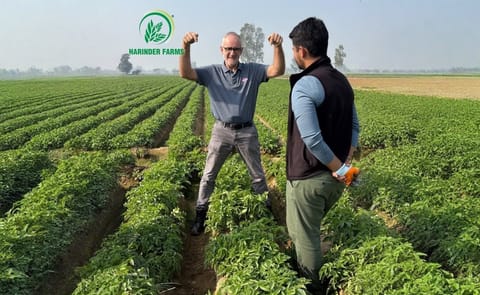DuRPh Scientists monitoring the status of the trial plots
Durably resistant potatoes with wild potato genes offer 80% reduction in chemical control

A research project into the development of potatoes with sustainable resistance against phytophthora via genetic modification with genes from wild potato varieties and good resistance management (DuRPh) has concluded with a scientific publication on the research results.
The Wageningen UR scientists indicated that their approach was successful in developing potato plants which require 80% less chemical control.
Scientific publication of the research results in Potato Research:
(free access)
A. J. Haverkort, P. M. Boonekamp, R. Hutten, E. Jacobsen, L. A. P. Lotz, G. J. T. Kessel, J. H. Vossen , R. G. F. Visser; Durable Late Blight Resistance in Potato Through Dynamic Varieties Obtained by Cisgenesis: Scientific and Societal Advances in the DuRPh Project Potato Research,Potato Research, January 2016 pp 1-32
The potato is the third food crop and offers a relatively high yield and valuable food per hectare. Global potato cultivation is, however, under threat from the pathogen Phytophthora infestans. Farmers who can afford to do so spray their crops against the pathogen with chemicals up to 15 times a year, which is both expensive and harmful to the environment. Farmers without the means for chemical control lose a large part of their yield in some years as a result of the disease.(free access)
A. J. Haverkort, P. M. Boonekamp, R. Hutten, E. Jacobsen, L. A. P. Lotz, G. J. T. Kessel, J. H. Vossen , R. G. F. Visser; Durable Late Blight Resistance in Potato Through Dynamic Varieties Obtained by Cisgenesis: Scientific and Societal Advances in the DuRPh Project Potato Research,Potato Research, January 2016 pp 1-32
Published in Potato Research, the scientific publication describes the ten-year DuRPh study performed by Wageningen UR commissioned by the Dutch Ministry of Economic Affairs. The goal of the research was to find ‘proof of principle’ for genetically modifying existing potato varieties solely with genes of potato species in order to develop a durable resistance against phytophthora. These potatoes could substantially reduce the global use of crop protection products and make a major contribution to the production of extra food.
To foster the durability of the resistance, Wageningen scientists brought combinations of resistance genes from wild potatoes over to cultivated potatoes, and developed a method for managing the use of various resistances.
The scientists mapped scores of resistance genes from wild potatoes of which nearly half were ‘cloned’ so that they could be transformed to existing potato varieties as single genes or in sets of two or three. After the scientists had determined that they could actually make susceptible potato varieties resistant, these potato plants were then multiplied to provide sufficient potatoes for research on trial fields.
The resistant potatoes were studied in the field in various ways. In small ‘monitoring plots’ they also were used to study which types of phytophthora were present on the land. In larger demonstration fields, visitors from the sector and the general public could see the success of the attempt to make vulnerable potatoes resistant to phytophthora for four consecutive years.
The DuRPh research also aimed to make an intrinsic contribution to the discussion about genetic modification in society. To achieve this, the Wageningen research team organised meetings for the potato chain, social organisations and the general public. Visitors were able to see the genetically modified potatoes in the field with their own eyes, and note how well they coped against the phytophthora disease. The scientists also delivered many presentations both in the Netherlands and abroad.
Like to receive news like this by email? Join and Subscribe!
Get the latest potato industry news straight to your WhatsApp. Join the PotatoPro WhatsApp Community!
精选企业
Sponsored Content
Sponsored Content
Sponsored Content
Sponsored Content










